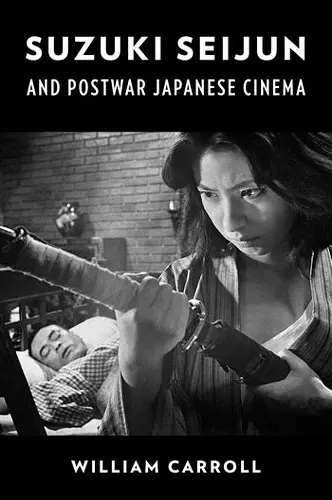Suzuki Seijun and Postwar Japanese Cinema
Format:Hardback
Publisher:Columbia University Press
Published:5th Jul '22
Currently unavailable, and unfortunately no date known when it will be back

In 1968, Suzuki Seijun—a low-budget genre filmmaker known for movies including Branded to Kill, Tokyo Drifter, and Youth of the Beast—was unceremoniously fired by Nikkatsu Studios. Soon to be known as the “Suzuki Seijun Incident,” his dismissal became a cause for leftist student protestors and a burgeoning group of cinephiles to rally around. His films rapidly emerged as central to debates over politics and aesthetics in Japanese cinema.
William Carroll offers a new account of Suzuki’s career that highlights the intersections of film theory, film production, cinephile culture, and politics in 1960s Japan. Carroll places Suzuki’s work between two factions that claimed him as one of their own after 1968: the New Left and its politicized theoretical practice on one hand, and the apparently apolitical cinephiles and their formalist criticism on the other. He considers how both of these strands of film theory shed light on the distinctive qualities of Suzuki’s films, and he explores how both Suzuki’s works and unheralded Japanese film theorists offer new ways of understanding world cinema.
This book presents both a major reinterpretation of Suzuki’s work—which influenced directors such as John Woo, Jim Jarmusch, and Quentin Tarantino—and a new lens on postwar Japanese film culture and industry. Suzuki Seijun and Postwar Japanese Cinema also includes a complete production history of Suzuki’s filmography along with never-before-discussed information about his unfinished film projects.
A filmography with several unreleased titles, including those for television, contributes to the richness of this work. -- Stephen Sarrazin * East Asia *
You’ll learn a lot from Suzuki Seijun and Postwar Japanese Cinema, and not just about the subject: this scholarly work tells the inspiring story of an artist with a distinct vision that neither time nor studio interference could ever truly tame. -- Pat Padua * Spectrum Culture *
Ever engaging, ever challenging, Suzuki Seijun and Postwar Japanese Cinema by William Carroll is an utter marvel. To those who have loved Suzuki Seijun as much as I have, you shall find so much to love in this comprehensive work and to those that adore Japanese cinema, this text manages to illuminate so much that it demands reading and should be in every cinephiles library. Highly Recommended!!! -- Ruben Rosario * FilmMonthly *
[A] meticulous analysis of the filmmaker’s output throughout the years. -- Dr. A. Ebert * PopCultureShelf.com *
Suzuki Seijun and Postwar Japanese Cinema is a thoughtful, stimulating, and rigorous study of a neglected Japanese filmmaker. It makes a major contribution to our understanding of critical discourses circulating in Japan and the situation of the domestic film industry during the protracted decline of the studio system. -- Isolde Standish, author of Politics, Porn, and Protest: Japanese Avant-Garde Cinema in the 1960s and 1970s
This groundbreaking book shows that Suzuki, far from being “incomprehensible,” was actually understood by—and deeply entwined with—competing theoretical schools in Japan. Carroll’s study offers not only illuminating analyses of Suzuki’s cinema of deviation within its historical context but also compelling expositions on what it means for cinema then and today. -- Aaron Gerow, Yale University
By lucidly setting out the cultural, political, technological, and studio contexts in which Suzuki operated, Carroll goes beyond the prevailing notions of the director as a maverick, iconoclast, and pop-cultural curio who dismissed his own works as ‘nonsense.’ This book presents a convincing argument as to what makes his films so eminently watchable to this day. -- Jasper Sharp, author of Historical Dictionary of Japanese Cinema
This is a very valuable contribution, not only to the study of Suzuki’s work and legacy, or to the study of Japanese cinema of the 1960s, but to the broader project of undoing the domination of English and European film theory within global film studies. * Japan Review *
A necessary read for all fans of Suzuki and of Japanese cinema in general. * Asian Movie Pulse *
Carroll’s rigorous examination of Suzuki’s craft provides abundant evidence of the intent and deliberation behind a body of work that has become known for eccentricity and offbeat abandon. This book offers an insightful appraisal of Suzuki’s filmography and his methodologies as a director, and provides a clear and accessible overview of the tumultuous postwar context for Japanese cinema. * Alphaville *
ISBN: 9780231204361
Dimensions: unknown
Weight: unknown
304 pages